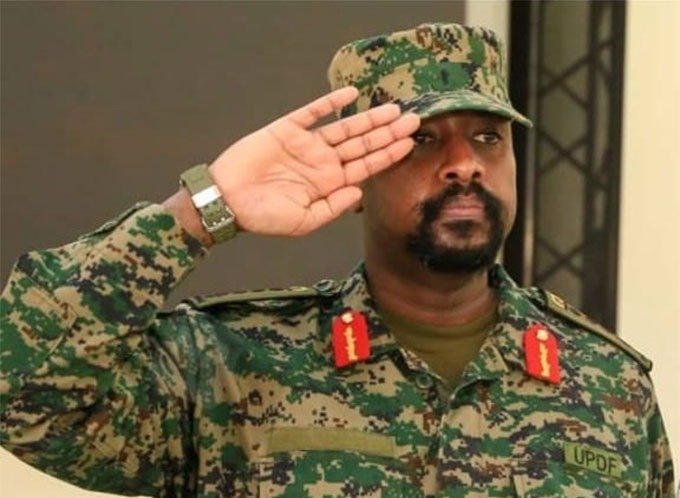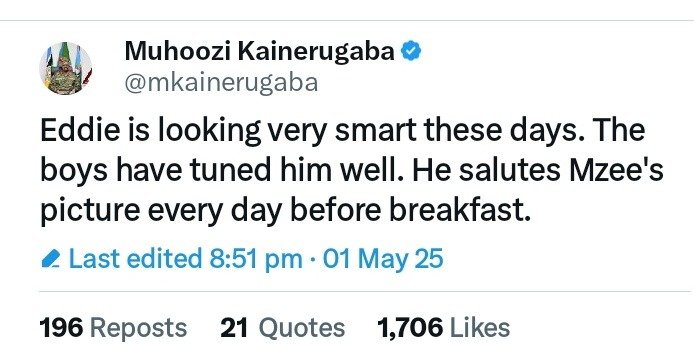In a shocking display of military impunity that has sent ripples through Uganda’s political landscape, General Muhoozi Kainerugaba, the Chief of Defence Forces (CDF), has brazenly confirmed what many feared—Eddie Mutwe, the trusted personal bodyguard of opposition leader Robert Kyagulanyi (Bobi Wine), is being held captive by the Ugandan military.
The situation represents a disturbing escalation in the ongoing tension between Uganda’s military establishment and opposition forces, raising serious questions about human rights, rule of law, and the increasingly hostile political environment in the country.
What began as rumors and worried speculation following Mutwe’s disappearance on Sunday evening has now been confirmed in the most troubling manner possible. General Muhoozi, son of Uganda’s long-serving President Yoweri Museveni, took to X (formerly Twitter) not only to confirm the abduction but to gloat about it in a series of posts that veered between threatening and mockery.
“He is in my basement. Learning Runyankore. You [Bobi Wine] are next!” declared Muhoozi in one particularly chilling message.
According to witnesses, Mutwe was seized at Kiwango trading center in Mukono Municipality by unidentified individuals wearing a mix of civilian clothes and military fatigues. This tactic—using unmarked vehicles and plainclothes operatives—has become an all-too-familiar pattern in Uganda, where “enforced disappearances” of opposition figures have sparked international concern.
What makes this case particularly alarming is not just the abduction itself, but the audacity with which a high-ranking military official publicly admitted to and celebrated what amounts to an extrajudicial detention.
This incident doesn’t exist in isolation but represents a continuation of a troubling pattern of harassment directed at members of the National Unity Platform (NUP) and other opposition groups in Uganda. For years, Bobi Wine and his associates have faced arbitrary arrests, violence, and intimidation—particularly during and after the contentious 2021 presidential election that saw President Museveni secure his sixth term amid allegations of irregularities.
Human rights organizations have consistently documented these abuses. A 2022 Human Rights Watch report noted that Ugandan security forces have “arbitrarily arrested opposition supporters and political activists, detained them incommunicado, and tortured or otherwise ill-treated them with impunity.”
The targeting of Mutwe, who serves as Bobi Wine’s primary security personnel, appears calculated to strike at the opposition leader’s inner circle and send a message of vulnerability to his supporters.
Perhaps equally disturbing as the abduction itself is the nature of Muhoozi’s public statements. His posts contain explicit tribal undertones, with references to forcing Mutwe to learn Runyankore (the language associated with Uganda’s ruling elite) and mocking his ethnicity.
“I captured NUP’s military commander like a grasshopper (Nsenene). If they keep on provoking us, we shall discipline them even more,” wrote Muhoozi in one post.
In another particularly dehumanizing statement, he wrote: “If you see Eddie’s head now he looks like an egg. Totally clean. The beards were the first thing the boys removed. After he finished crying and urinating.”
These statements not only confirm detention but suggest mistreatment and possibly torture—issues that should alarm anyone concerned with human rights and democratic governance. Furthermore, they deliberately evoke ethnic divisions in a country still healing from a history of sectarian conflict.
The casual nature of these threats, including suggestions of castration and warnings that Bobi Wine would be “next,” represent a dangerous normalization of political violence from one of the country’s top military leaders.
This abduction comes on the heels of significant restructuring within the UPDF’s intelligence apparatus. Muhoozi recently replaced Major General James Birungi with Major General Richard Otto as head of the Chieftaincy of Military Intelligence (CMI). This timing raises questions about whether the change in leadership signals a more aggressive approach toward opposition figures.
The CMI has long been accused by human rights groups of being at the center of arbitrary detentions, torture, and enforced disappearances in Uganda. This reshuffling, followed immediately by such a high-profile abduction, suggests potential shifts in operational strategies that could have significant implications for political freedoms in Uganda.
The brazen nature of both the abduction and Muhoozi’s public boasting about it presents a difficult challenge for Uganda’s international partners, particularly Western nations that provide significant aid and military assistance to the country.
The United States and European Union have previously expressed concerns about human rights abuses in Uganda but have stopped short of imposing meaningful consequences. This latest incident tests the international community’s resolve to stand firmly for democratic principles and human rights protection.
For regional observers, the situation represents a worrying example of how military power can be wielded against political opposition with apparent impunity. In a region where several countries are experiencing democratic backsliding, Uganda’s example could embolden similar actions elsewhere if left unchallenged.
Bobi Wine, who rose from music stardom to become Uganda’s most prominent opposition figure, quickly took to social media to demand Mutwe’s immediate release. Known for his ability to mobilize Uganda’s youth through his message of change and accountability, Wine’s response to this provocation will be closely watched.
“The regime has once again demonstrated its contempt for the rule of law,” Wine stated in response to the abduction. “Eddie Mutwe has committed no crime except to stand for a better Uganda.”
Wine’s National Unity Platform party has consistently advocated for nonviolent resistance despite facing severe repression. This approach has garnered significant international sympathy but has yet to translate into meaningful protection for party members from state-sponsored violence and intimidation.
As Eddie Mutwe remains in military custody under uncertain legal circumstances, his case represents more than just an individual human rights violation. It embodies a critical moment for Uganda’s democratic trajectory and the rule of law.
The international community, civil society organizations, and Ugandan citizens face an important test: Will this brazen display of military impunity be met with meaningful pressure for accountability, or will it simply become another episode in a troubling pattern of political repression?



